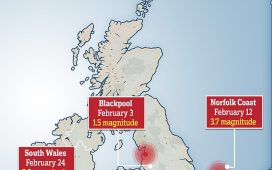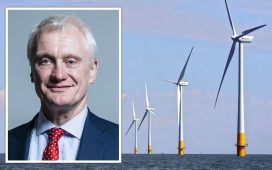[ad_1]
When the astronaut Tim Peake was living aboard the International Space Station (ISS) back in 2016 – he was the first Briton ever to do so – he got into the habit of taking his toothbrush to the enormous observatory windows, so he could clean his teeth while enjoying a view of the planet that stretched 1,000 miles in every direction. He could see all of Europe at a glance. Whole oceans. As Peake writes in a new autobiography, out this month, he would be idly scrubbing his choppers and suddenly “catch sight of the wind-sculpted sands of the Sahara, a gently smoking Siberian volcano, the lights of a thousand night-fishing boats glimmering in the Gulf of Thailand”.
He now lives in a peaceful village not far from Guildford in Surrey, and when I visit him at home, I ask him about the quality of the scenery when he brushes his teeth, these days. He shows me a bathroom-window view of the back garden. Washing line. Decking. Trampoline. “Not quite the same,” he agrees.
Peake is red-haired, freckled, slight, and courteous. The 48-year-old – who was once jointly responsible for the running of a $100bn space station – answers the door in furry slippers, and apologises for the unevenness of the gravel on his drive. “Any trouble parking?” He walks me through to the kitchen, where his boys have been baking; a promising-looking carrot cake sits on the counter, and there is homemade soup on the hob. A huge part of his life, since he got back from orbit, has been to field people’s curiosity. “You’re an ambassador for space. It’s something you need to get comfortable with.” He tries to give strangers what they need from him, feeling easier with scientific and practical inquiries than spiritual or emotional ones. Before Peake became an astronaut, he was a soldier and a test pilot. He has the unflappable style of someone who has learned, through endless tests of their own mortality, not to worry about anything too much. He lets me ask whatever weirdo nonsense I want.
Is the Russian part of the ISS decorated differently from the American part, I ask. Yes, says Peake. “It has carpet panels on the walls. Beige carpet. Why, I have no idea.”
Do you come to think about the space station as a colleague in its own right? “You get to love it as a piece of engineering. You get to know it and its idiosyncrasies. You do personify it, almost as though it’s a living thing.”
Going by the disaster films we watch back on Earth (Gravity, Deep Impact, the rest), the ultimate human nightmare about space seems to be floating off, adrift, while our air supply runs out. Were you ever trained for such a thing, that slow death?
Peake doesn’t hesitate. Apparently other morbid types have tried this one before. “We don’t dwell on things that are outside of our control. So if that was the scenario, where we’re tumbling off, and there are things we can do about it, then absolutely, we’ll train for it. But if it’s a case of there being no way of recovering the situation, it’s something you accept as a catastrophic malfunction. And that’s not going to be a very pleasant, y’know, day and a half or whatever.”
I ask him, next, what’s it like to cry in space. At last Peake is brought up short. He considers it. “I can’t remember the last time I cried. Because of my background, perhaps, I suppress those emotions. You get used to doing that.” He moves a hand over his chest and stomach. “I feel the emotion. But then I put the brake on it. I think that probably comes from years of military experience. I’m not sure – I haven’t really overanalysed that.”
Making a mental note to try to overanalyse it later, I ask Peake one more question. For whatever reason, we Earth dwellers tend to associate trips to space with upgrades in wisdom and insight. Astronauts fly up as ordinary men and women, and, when they return, they’re revered: treated as sages. I ask Peake if he ever feels he’s a disappointment to people. When they meet him, are they let down by his being a normal dude, a slipper-wearing village dad?
“I do feel that,” he says. “Sometimes, when people ask me about religion or spirituality… that’s just not me. I’ve got a very scientific grounding, and that’s when I sense there’s a disappointment. They want me to have had this incredible epiphany up there, this religious experience. And that just wasn’t the case. There’s a change of perspective, I suppose, and a broadening of horizons. But does that suddenly make you wise in spheres outside your expertise? People assume it does – and, of course, it doesn’t.”

The other night, he says, he was out here in the garden while his dog did a wee behind the shed. He looked up and saw Mars in the night sky, and wrote a quick message to his 1.5 million Twitter followers: quick, look west! “Mars is looking bright and stunning right now.” As dozens of internet pedants were quick to point out, Mars was in the east at the time. Peake wrote an apologetic coda, reminding people never to put too much faith in astronauts.
“You’re a normal person. You make mistakes,” he tells me. “You’ve been just as clumsy as anybody else along the way.”
***
Peake grew up in 1970s Chichester in West Sussex, a place that’s described in his memoir as one of caravans and Datsun Sunnys in the drive, model-aeroplane meetings on the weekends, all of it flat and happy and familiar. The son of a journalist and a midwife, he was an unexceptional student. He had no interest in space beyond a beloved Lego model of an orbiter shuttle. At the age of nine, he watched a Blue Peter featurette on the air stunts that were a centrepiece of the latest James Bond movie, and a lifelong obsession with helicopters took hold.
As a route to possible flying opportunities, he joined the army cadets at 13, accepting as the price of entry many insults about his red hair as well as the painful rub of the khaki uniform against his sensitive skin. He left school at 18 with middling A-levels, at which point, he insists, it would have seemed hilarious to everybody there to think he’d be returning, two decades later, to have a building named after him.
Aged 19, he went into the army proper and over the next two decades rose through the ranks to major, serving in Northern Ireland, Kenya, Bosnia and Afghanistan, often as an Air Corps helicopter pilot. For years he was based in Gütersloh, Germany. It was there that he met his future wife, Rebecca, a Scottish lieutenant who was stopping off en route to Kosovo. Peake, who says he was generally shy around women (“stymied, romantically speaking” by a single-sex education and the years of ginger-shaming), was dating a military policewoman at the time. “I was rubbish,” he writes in his book, detailing a brief and messy love triangle. Long story short, the military policewoman ended up pouring a two-litre bottle of milk over his stereo, and Peake proposed to Rebecca. After they married in 2000, Rebecca left the army and they moved to Fort Hood in Texas, where he trained as an Apache gun pilot.
It was the grace and peace of flight that had first appealed to this softly spoken man. At the start of his career, he says, “it was all about a passion for flying, the act of flying. And then suddenly I found myself sitting down in America and being taught to be a gun pilot. At which point it was less about flying and more about what you’re flying, why you’re flying it.”
By this time, the US and the UK had invaded Iraq and Afghanistan and were deep into a pair of long, lethal wars. If Peake was going to fly in, it would be to kill people. “This is the job that you could be asked to do. And, for me, that was a much bigger change of mindset than any politics regarding deployment.” In the end he was not sent as a combat pilot. “I’m grateful that push didn’t come to shove. I would have reconciled myself with it, but it’s not something I would have embraced.”
Peake became an instructor and a military test pilot instead. Towards the end of his time in the army, and when Rebecca was pregnant with their first son, the couple saw an advert put out by the European Space Agency (ESA), “seeking new talents to reinforce its astronaut team”. He was one of 8,000 hopefuls who applied online. They were whittled down over the course of a year, until Peake and three others were unveiled at a press conference in Paris in 2009.
From the start, in his memory of things, reporters were fascinated by the back-room politics that had led to a Briton being selected for a coveted astronaut gig. Traditionally, successful candidates came from France, Italy, Germany and Spain; countries that contributed the most cash towards human spaceflight. In his book, Peake is admirably honest about the brazen horse-trading that went on. “Funding and politics, that’s just the nature of the game… I’m sure I did OK, but I’m also sure any one of the 10 people in that last interview round would have made an equally good European astronaut.” He assumes that one of the reasons he was picked was to encourage the UK to invest more.
I ask if he thinks access to space will ever be democratised, or will it always be a horse-trade?
“Horse-trade,” Peake says. “I think, in fairness to the ESA, they really have tried hard to make it a level playing field. But you’re always going to have political wrangling when it comes to astronaut missions. They just have [too much] national prestige attached to them. I don’t see that changing.”
He spent five years in training, learning how to cope with G-force and zero-gravity living; the rudiments of the spacewalk; and how to live in isolation with his future crew mates, including the American Tim Kopra and Russian cosmonaut Yuri Malenchenko. By December 2015, they were ready to go. The vibe in the rocket, as they sat on a launchpad in Kazakhstan, sounds pretty casual. Peake knew Kopra hated Lady Gaga, so he had requested lots of Gaga be piped in.
After bangs, roars and stomach-clenching speeds, they were hundreds of miles above the Earth and Peake could float up to his little porthole to get a first look at the sea of Japan. There was some drama when they first tried to dock with the space station, their fuel dwindling after a couple of abortive attempts. Peake was mildly chastised by a colleague for swearing on arrival. Mission control would be listening to everything he said from now on; every minute of his time would be strictly accounted for. His six months in the universe’s strangest Airbnb had begun.
***
Up at six. Asleep by 11. When Peake first tried to move around without anything to hold on to, he felt like “a puppy on a shiny floor”. But soon he was doing quintuple spins and superhero-ing all over. He became so familiar with the space station’s orbital path that he could tell when they were over the Sahara from the orange tint of the reflected desert light.
There were screw-ups, such as the time he spilled 150 M&M’s and had to bob around retrieving them all. Peake made international news, one day, after he dialled a wrong number from space. He was trying to ring his sister. “Is that Planet Earth?” Peake asked, cheekily. A stranger replied, “No, it’s not”, and hung up. Calls that did go through included one-off celebrity catchups with Stephen Hawking and Brian May. Every night, Peake rang Rebecca, who was living in Texas with their boys and was not afraid of being blunt with her absent husband. “Busy! Talk later!”
The apex of the trip was his spacewalk, on 15 January 2016. Peake became the first Briton to don the familiar white pressure suit and bob around on a tether in space. He spent almost five hours on the edge of infinity, doing maintenance work on the station’s exterior. Once, during a break, he let himself drift to the end of his rope, to absorb it all, “the serenity. It’s still quite fresh in my mind.” He remembers the sensation of a whole gaping universe over his right shoulder. And then a weird and incongruous sense of vertigo (the only time he experienced it) when he looked down and saw Western Australia beneath his white-booted feet.

After that, it was back to the daily chores, his onboard science experiments, his emailed answers to schoolchildren’s questions. He presented a Brit award, ran a simulated version of the London Marathon, and recorded a Channel 4 cookery programme with Heston Blumenthal. “It is a strange mix,” Peake concedes.
When it was time to come back, in June 2016, he and his two crew mates climbed into a little Russian-made capsule (Peake relished the detail of there being a paper map of the world tucked into one of the seats) and departed. One last orbit, a goodbye-glimpse of the Persian Gulf, and then they were tumbling back to Kazakhstan. Flames scorched the windows. They were jerked about as the parachutes deployed. Then a bump, and Peake felt his own weight for the first time since Christmas.
What was it like saying goodbye to crew mates he’d lived hugger-mugger with for so long?
Unsatisfying, Peake says. “We landed. And then a couple of hours later, I was saying cheerio. There was a real moment, saying goodbye to Tim Kopra [especially], where we both realised… I mean, neither of us are emotional people, it wasn’t hugs and tears, but there was a moment when we looked at each other. Shook hands. Man-hugged. We knew we were drawing a line under something. That was the mission over. New phase starting. It was very, very abrupt. And that was tough.”
Peake explains that in the British army, when a soldier returns from an extreme situation such as a war zone, care is taken to ease them back into domestic life. “But landing from space… A few hours later, the kids were jumping on the bed. ‘Daddy’s home!’ You were straight back into it. Quite a harsh transition – something so different, so quickly.”

There were ups and downs on his return. He got vertigo in the shower (something to do with the water rushing past his ears) and readjusted to the constant wearying pull of the Earth. (“Gravity sucks.”) More significantly, he came to realise that he’d spent too much time away from his sons. By the time he landed, Peake writes: “Thomas was turning eight, Oliver five and, if truth be known, I had probably been around for only 50% of their lives.” The family moved to Germany for a couple of years, while Peake was doing desk work and spending as much time as he could with his children. In 2019 they moved to the UK.
It’s quite something, I say, to realise you’ve missed half of your children’s lives. Peake nods. “In a military environment, it’s more familiar. And Rebecca had grown up with a father who worked on oil rigs. Two weeks on, two weeks off. She was used to it. But it wasn’t easy.”
I ask, again, has he really never cried during any of these experiences?
Peake thinks of a time, the other week, when he was recording the audiobook of his memoir. He felt himself welling up while going over the parts in which he had to say goodbye. (In one of the most affecting scenes, he writes: “I would smile [at my sons] as hard as I could while thinking, ‘Don’t let this be the last time that I see you.’”) Peake says: “These are extremely emotional events. That was… heart-wrenching, yeah. I knew it would be. I’d seen other colleagues in those goodbye moments, and you know what they’re thinking. We’re all thinking the same thing.”
Which is?
“That it can happen to you. That maybe it won’t be a good outcome. We put a professional face on it. But you go up there on that rocket and you’re rolling a die, and there’s no other way of putting it, really.”
The book, which intimately tracks four decades of his life from youth to orbit, stops abruptly after Peake’s return to Earth. He says this was an editorial decision. He doesn’t think he’ll go into space for such a long time again (“Not now the boys are older”), but he does expect to go back. “It looks like there’s a great chance I’ll get a second mission in 2024.”
When you read the book, though, you suspect nothing has mattered quite so much since he was up there. I had to turn to Instagram to learn about Peake’s life, from splashdown in the spring of 2016 to lockdown in the spring of 2020. Trips to Goodwood and the rugby. Charity runs, school visits, tree-plantings. He flew with the Red Arrows and earlier this year retook the test for his helicopter licence.

Now, halfway through a two-year hiatus from the ESA, he has been giving talks. Sometimes, while trying to find a video clip that he wants to show an audience, he’ll sit in his home office and watch chunks of footage from his time in space. “And every time I do that, I can get the original sensation. I occasionally watch it to get that buzz.”
At his home, we gaze out at the washing line, the trampoline, the wooded council land at the end of his garden. Would he trade all this to be back up there, brushing his teeth again with a view of a smoking Siberian volcano? Peake waves the idea away. He says he realised, soon after landing – after going for his first jog in the open air, after going for a first outdoor pint with Rebecca – that there is no serious competition to life on Earth. “Because what’s bizarre up there is the juxtaposition. You’re looking out, every day, and you’re seeing Earth in all its glory. But you can’t appreciate that glory. The changing weather. The times of day. There’s nothing green. None of the smells. You’re viewing the Earth as a spectator, you’re not actually experiencing it.”
He says he prefers it close up, tangible. “Earth as a home.”
• Tim Peake’s Limitless: The Autobiography is published by Cornerstone on 15 October, RRP £20. To order a copy for £17.40, visit guardianbookshop.com
[ad_2]
READ SOURCE





